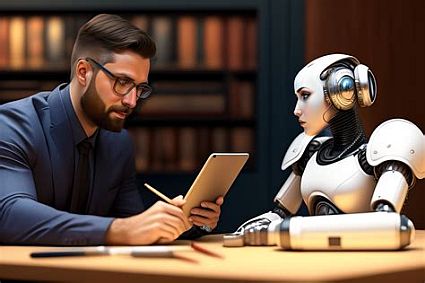We are, as we should be, enamored with the potential of AI, particularly LLMs. Every day, we discover something new that we can do with these tools. How we eliminate work our people have to do. How we improve our people’s productivity. How we eliminate our people and fully automate interactions with customers and each other….. Hmmmm?
We are learning how to deal with and minimize hallucinations, making these tools much more accurate. We are trying to figure out how we make the experience of working with Chatbots more human-like, neglecting the fact that it is more likely that my bot will be talking to your bot. It appears, the majority of interactions/content, even people on LinkedIn are AI generated or AI bots.
We seem to be losing people, human beings, in the process.
After researching with a few of my buddies, ChatGPT, Claude, Perplexity, Co-Pilot, there are no organizations that operate without or without serving people. There are a lot of things that are fully automated, this is not new, but their function is to, somehow, serve people, whether it’s their owners/shareholders, their partners or customers. There are no “companies” that operate without human beings, though there are some approaching this (DAOs, AI Trading Systems, Blockchain Autonomous Systems). While we may see organizations that require no human beings, AI doesn’t see any intrinsic value in dealing with itself. The intrinsic value is all about the people it serves.
I suppose, AI is stuck with the messiness of dealing with and serving human beings.
Yet too many humans seem to want to limit human interactions. This seems so ironic, because as we look at health and related issues, we are better, happier, more fulfilled when we are engaged and interacting with each other.
The most interesting conversations/reading I have about AI are with some of the real leaders in AI research is about human beings. Whether it is the “humans in the middle” that coach and train the AI tools to make better predictions/fewer hallucinations. Or it’s how we become better at doing the things AI can’t do.
What all these experts/researchers/PhDs are saying is human beings are critical to making AI better, and AI can help make human beings better.
So how do we build better human beings–or, more pragmatically, how do we get better at doing the things AI can’t do?
They seem obvious, but there seems so little focus in developing our skills and capabilities, to help us recognize and perform better doing the things that AI can’t do. Some thoughts:
- Genuine emotional empathy. AI cannot “feel” emotions or share a person’s emotional state. It is insensitive to the nuance of these emotions and fails to detect or connect in meaningful ways. What if we started developing people’s abilities to genuinely care and connect with people in meaningful ways? What would that mean in our ability to engage, build trust and confidence with each other. Developing these skills is starts with internal cultures of genuine caring and engagement. It is critical that leaders model these behaviors in every interaction internally and with others.
- Hypercontextuality, perhaps otherwise stated as being in the moment. Because AI is bad at recognizing and dealing with emotion, it fails to recognize the nuances that exist in real time conversations with people. Sadly, too many sellers have become terrible at this as well (perhaps that’s why so many choose the AI alternative). Developing our people’s skills in collaborative conversations not only improves our own internal experience and productivity, but also drives higher levels of customer experience and engagement.
- Imagination and innovation. AI can help us discover new things, sometimes seeing things differently. But the models are built such that they are constrained by how they are trained. But most innovation and creativity comes from connecting dots in very disparate, often random ways. Diverse experiences, points of view help us see new things, see things differently, and combine ideas that might never have been imagined. It is the unpredictability of these processes that make AI less effective and plays to the strengths of human being. If we free humans up to innovate, imagine, and create, we build stronger businesses, stronger societies, grow and learn.
I’ll stop here, there are many other areas. We should be excited about the capabilities that AI brings. One of the main reasons I am so intrigued by AI is not so much in exploring what it can do, but in understanding what it can’t and can only be done by human beings. It is this, in combination with what AI can do that will change our worlds.
Afterword: Attached is the AI generated discussion of this post. These discussions are always interesting, but there is a particular irony in this discussion. The AI agents are expressing themselves as “human characters,” talking about “building better humans.” I went through 3 iterations in training the tool on this particular article. I tried to get it to recognize these AI characters are trying to express things as humans, but what would be more interesting would be to recognize they are only AI agents, an it would be more interesting to have an AI perspective of this issue.
I failed in trying to get it to shift the perspective. So, while the discussion is very good, it’s so interesting to recognize this is AI thinking it is behaving as humans would behave.
Enjoy!

Leave a Reply